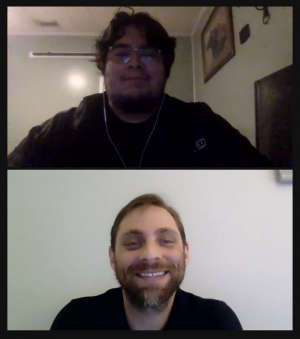San Jac earns top scores at international math competition
For many people, just hearing the words "differential equations" makes their stomach twist into knots, but for Dr. Nate Wiggins' math and engineering students, it's just another walk in the park. But not just any park — the SIMIODE Challenge Using Differential Equations Modeling (SCUDEM), a global competitive math competition featuring students from the top schools around the world.

Not only would some place third in the world alongside teams from Moscow and Beijing, but they would turn heads doing it.
SIMIODE offers realistic scenarios to explore, reasons for learning differential equations, ways to see how technologies expand "what if" questions, and opportunities to develop approaches that will be useful. SCUDEM brings students together from top high schools and colleges around the world, presenting teams with real-world challenges that use differential equations to create solutions.
Teams choose their problems from the prompts given, then have three weeks to come up with their equation, its solution, and a presentation for the judges. Due to COVID-19 safety restrictions, this year the entire competition was held virtually.
"San Jac was the only community college in the competition, and we had one of the largest U.S. teams," said Wiggins, San Jacinto College math and engineering professor. "Our median scores were slightly above average in the nation, which means that our students are performing at extremely high levels. Students are up for the challenge, and the College is giving them the opportunities to see what they're capable of accomplishing. This competition is all about raw talent. Thousands of judges — from high-end scientists and college professors to major companies and military experts — watch these students go to work and are eager to see what they come up with because they will be the new talent coming into these industries. Raw talent in math is hard to predict and usually comes from unexpected people."
In total, 250 teams from across the globe began the competition, with 130 teams finishing. Of those, 23 teams were from San Jacinto College. After final judging, 27 teams received an Outstanding Award, the highest in the competition. Two of those teams were from the College, with one scoring extremely high, putting them in the company of the top institutions in the world.
Engineering student Diego Zuniga says the teamwork experience was one of the best aspects the competition provided.
"As someone who is pursuing a career in engineering, getting an opportunity to work on a team was great because teamwork is essential in engineering," said Zuniga. "Our biggest challenge for our problem was understanding a report we were given as a resource. Because our problem dealt with an oil spill, the report used a lot of petroleum-related terminology for certain numbers that we weren't familiar with. Once we did more research on the terminology and fully understood the report and its data, we were able to work much faster. Ultimately, everyone on our team brought certain strengths to the table, and that allowed us to develop a creative equation and solution that addressed porosity and how it affected the life expectancy of petroleum."
Zuniga also encourages students in any discipline to take advantage of opportunities like these when they come along. Although they may be intimidating, the experience itself holds the most value.
"Take chances," he said. "Don't sell yourself short. This competition was an eye-opener for me. Whatever field you want to pursue professionally, opportunities like these can help you expand your passion and understanding of whatever it is you're interested in."
Learn more about San Jacinto College's science, technology, engineering, and math programs.
